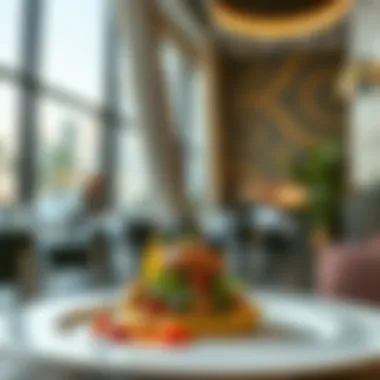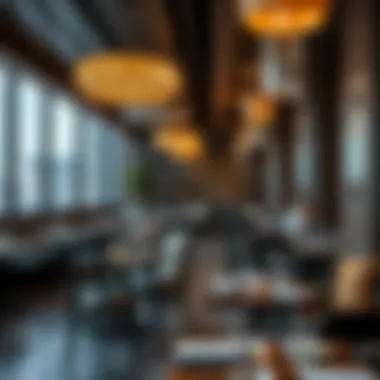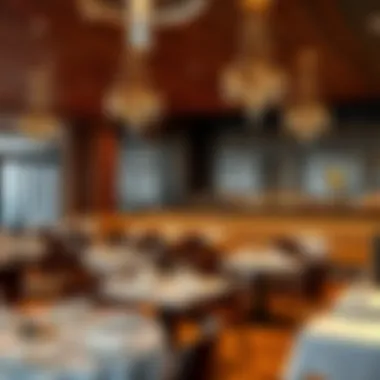A Comprehensive Guide to Dubai's Best Restaurants


Intro
Dubai has burgeoned into a haven for gastronomes, where culinary creativity knows no bounds. Each restaurant tells a story, offering more than just meals but an experience that tantalizes the senses. This landscape is not just about dining; it embodies culture, tradition, and innovation. As we traverse this vibrant realm, we uncover a world that reflects Dubai's cosmopolitan nature.
The region's culinary scene is a melting pot, comprising varied influences and styles; whether you’re looking to indulge in high-end dining or simpler, more homely fare, there's something for everyone. The rise in prestigious dining establishments has drawn attention not only from food enthusiasts but also from investors and entrepreneurs eager to stake their claim in this thriving market.
To fully appreciate the diversity of offerings, it’s imperative to delve into the factors that elevate some restaurants above the rest. What sets them apart? Is it the chefs' expertise? The carefully crafted ambiance? Or perhaps the exceptional service that accompanies every dish? Let’s embark on a journey through Dubai’s culinary landscape, exploring what makes the top restaurants standout destinations.
Market Analysis
Understanding the market dynamics is essential for anyone looking to engage with Dubai's culinary scene. As the city continues to grow, both in terms of population and tourism, the importance of these restaurants becomes more pronounced. Where there are discerning diners, opportunities arise.
Current Trends in Dubai Culinary Scene
Recent years have seen a noticeable shift towards sustainability in food sourcing and preparation. Many establishments now prioritize locally sourced ingredients, aiming to reduce their carbon footprint while ensuring freshness. There’s also a growing demand for plant-based options, as more diners seek meals that align with their environmental values. Expect to see many establishments incorporate innovative dishes that cater to this rising trend.
Historical Market Performance
The evolution of Dubai's restaurant industry can be traced back to its early days when culinary offerings were focused primarily on traditional Arabian fare. Over the decades, as Dubai transformed into a global metropolis, the scope widened dramatically. More cuisines have taken root, heightening competition and pushing quality upwards.
Restaurants that have stood the test of time often do so by continually adapting to changing tastes and trends. Establishments that embrace innovation while maintaining authenticity tend to thrive in such a competitive market.
“Gastronomy is the bridge between cultures, and Dubai is where the world comes to dine.”
Investment Opportunities
With the culinary scene booming, it's worth considering potential investment opportunities. Restaurants, particularly those that offer something unique, can yield substantial returns.
Best Areas for Culinary Investment
When scouting for potential gastronomic investments, it is essential to consider location.
- The Dubai Marina offers panoramic views and a vibrant nightlife, making it an attractive spot for high-end dining establishments.
- Downtown Dubai, with its iconic landmarks like the Burj Khalifa, attracts tourists and locals alike, providing a steady stream of diners.
- Areas like Jumeirah benefit from affluent neighborhoods that are keen on unique culinary experiences.
Understanding Restaurant Value Appreciation
Restaurants can appreciate in value when they build a loyal consumer base and adapt to evolving trends. Factors such as menu innovation, exceptional service, and strong marketing are critical. By closely monitoring customer feedback and engaging with patrons, restaurants can enhance their offerings and, consequently, their standing in the market.
In summary, Dubai's culinary landscape is reflective of a broader transformation in food culture. With each restaurant presenting its own narrative, understanding the nuances behind their success can pave the way for potential investors and lovers of fine dining alike.
Preamble to Dubai's Culinary Scene
Dubai's culinary landscape is a captivating tapestry woven from various threads of culture, innovation, and gastronomy. Nestled strategically between East and West, Dubai has evolved not just as a bustling market for trade but as a hub for food lovers from around the globe. As we journey through the top dining establishments of this remarkable city, it's crucial to understand how these experiences shape both the culinary reputation and the cultural identity of Dubai.
The Importance of Dining Experiences
When considering the vibrant dining scene in Dubai, one can’t overlook the fundamental significance of dining experiences. Restaurants here are not merely places to grab a meal; they are the beating heart of social interaction and cultural exchange. A meal in Dubai often transcends the act of eating; it embodies a moment shared with family, friends, or colleagues.
The atmosphere, flavors, and presentation of food collectively contribute to an unforgettable experience. For instance, the joy of savoring a perfectly grilled kebab while seated amidst stunning views of the Burj Khalifa turns a simple dinner into a memory etched in one’s mind.
Dining out in Dubai is a celebration. It's where innovation meets tradition, merging contemporary practices with age-old recipes. This unique twist elevates the experience, making patrons feel like they are part of something much larger than just enjoying a meal. Choosing the right restaurant can lead to exciting new tastes that may very well have guests returning. The perception of a 'top restaurant' is forged not only through the food served but through the complete package offered by the ambiance, service, and overall experience.
Cultural Influences on Dubai's Cuisine


The culinary scene of Dubai is a sensory explosion shaped by several cultural influences. The city's rich history as a trading hub means it has welcomed flavors from various corners of the globe. From traditional Middle Eastern dishes to contemporary Asian fusion, the possibilities are endless.
The intermingling of different cultures is evident in the menu offerings throughout the city. For instance, you might find an Indian restaurant proudly serving butter chicken, prepared in a traditional way yet juxtaposed alongside a French fine dining establishment featuring an unforgettably exquisite duck confit.
Moreover, local Emirati cuisine adds another layer of depth to Dubai's gastronomic profile. Traditional meals like Al Harees and Machboos showcase the culinary heritage of the UAE and offer insight into local flavors.
"Food is a bridge that connects cultures, and in Dubai, it serves as a reminder of the city's multicultural identity."
Thus, understanding the cultural influences on Dubai's cuisine not only enhances the appreciation of each dish but also reflects the spirit of this cosmopolitan city. It showcases a society that thrives on diversity and collaboration, firmly rooting its culinary scene in a global context.
By exploring these elements, we set the stage for a deeper understanding of what makes Dubai's top restaurants not just places to eat but rather experiences that resonate well beyond the taste buds. In the sections to follow, we will delve into the criteria that define these establishments and highlight some iconic restaurants that encapsulate the best of Dubai's culinary offerings.
Criteria for Defining Top Restaurants
Defining what makes a restaurant stand out in a city as diverse and bustling as Dubai involves much more than just a tasty meal. Certain criteria play a crucial role in establishing an eatery as a top-tier experience worth visiting. These factors not only enhance the overall enjoyment of the dining experience but also contribute to the loyalty and reputation that restaurants cultivate over time.
Innovative Menu Design
When it comes to crafting a memorable dining experience, an innovative menu can be the tipping point. In today’s culinary world, creativity on the plate is king. Restaurants that embrace unique flavor combinations and experiment with plating are more likely to capture the attention of discerning diners. A restaurant’s menu should tell a story, reflecting the chef’s passion and creativity while enticing patrons to try something new. Trends such as fusion cuisine are gaining traction, offering diners the chance to experience a blend of culinary traditions in one sitting. It's this blend that sets apart eateries like Zuma, where classic Japanese techniques meet contemporary flair.
Ambiance and Interior Design
The ambiance is the stage upon which the dining experience unfolds. A well-thought-out interior design not only complements the cuisine but also sets the mood for the evening. Whether it’s an open-air terrace overlooking the Marina or a cozy, dimly-lit nook, the setting should resonate with the theme of the restaurant. Interior design elements, such as furniture, lighting, and decor, contribute significantly to the feel of a place. For instance, the lush greenery and open spaces at the Restaurant at the Address offer a serene escape from the bustling city outside, making it ideal for both relaxation and celebration. An inviting atmosphere invites patrons to linger, savor, and return.
Exceptional Customer Service
Front-line interactions play an indispensable role in the dining experience. Exceptional customer service can elevate an ordinary meal into an extraordinary outing. Staff who are attentive without being intrusive, knowledgeable, and genuinely passionate about what they serve can enhance a guest’s experience manifold. It’s not just about delivering the food; it's about crafting a journey. A visit to a restaurant like La Petite Maison highlights this aspect perfectly, where knowledgeable waitstaff can explain each dish, making diners feel valued and informed, thus creating a stronger connection to the meal.
Consistent Quality of Food
A restaurant's reputation heavily depends on its ability to deliver consistent quality with every dish. When diners know they can rely on an establishment for their favorite meal, they are likely to return. Any fluctuation in quality can lead to disappointment and lost clientele. Restaurants such as Nobu have established a reputation for consistency, ensuring that every bite of their Miso Black Cod lives up to the high expectations set by previous experiences. Quality ingredients, skilled preparation, and skilled chefs all contribute towards maintaining this important factor that solidifies a restaurant's place among the elite in Dubai’s culinary scene.
In summary, the criteria for defining top restaurants in Dubai hinge on their innovative menus, inviting ambiances, attentive service, and consistent quality. These aspects work synergistically to create memorable dining experiences that keep patrons returning.
Through careful consideration of these elements, both diners and investors can gain insights into what truly makes a restaurant renowned. The culinary landscape is ever-evolving, but those who master these criteria stand out in a competitive market.
Highlighting Iconic Restaurants
Highlighting iconic restaurants is crucial for understanding the culinary picture in Dubai. These establishments not only represent the rich tapestry of flavors and techniques that define the dining experience in the emirate, but also serve as benchmarks for quality, innovation, and unparalleled service. By examining iconic restaurants, food enthusiasts and investors alike can gain insights into culinary trends, market dynamics, and the evolving tastes of the local and international clientele.
Contemporary Dining Hotspots
Dubai has become synonymous with contemporary dining hotspots, where modernity meets culinary creativity. A prime example is Zuma, well-known for its sophisticated take on Japanese cuisine and chic atmosphere. The restaurant transforms dining into a theatrical experience with its open kitchen and stylish design. Another notable mention is Nammos Dubai, located at the Four Seasons Resort. It has redefined Mediterranean dining, blending fine dining with beach club vibes in a stunning seaside location.
These venues are crucial as they often set the stage for what’s trending in food innovations and customer engagement. They attract a mix of local residents, tourists, and food critics, thus influencing the culinary landscape significantly.
Traditional Cuisine Establishments
In a city marked by skyscrapers and modern amenities, traditional cuisine establishments offer a taste of heritage and cultural authenticity. Places like Al Iwan, situated within the Burj Al Arab, present an enchanting Arabian dining experience. Guests not only enjoy sumptuous dishes but also revel in the extravagant surroundings that reflect the region's rich history.
Another gem is Bait Al Wakeel, known for its traditional Emirati dishes such as Al Harees and Al Majboos. This spot is not just a restaurant, but a cultural experience that allows diners to connect with the ancient flavors of the region. These establishments highlight Dubai’s commitment to preserving its culinary roots while catering to a diverse audience.
Fine Dining Experiences


Fine dining in Dubai is a journey rather than just a meal. At.mosphere, located on the 122nd floor of the Burj Khalifa, embodies luxury dining with its stunning views and exquisite menu crafted by renowned chefs. It offers a unique blend of ambiance, culinary excellence, and stellar service that creates an unforgettable experience.
Similarly, Pierchic, nestled on its private pier, specializes in seafood and boasts a romantic setting. The restaurant emphasizes fresh, local ingredients and masterful preparation, reflecting the rich maritime culture of the UAE. Fine dining is pivotal as it attracts high-end clientele and plays a significant role in establishing Dubai as a global culinary destination.
Iconic restaurants do not merely serve food; they create a narrative, fostering connections and experiences that linger long after the meal is over.
By highlighting these iconic locations, one sees the multifaceted nature of Dubai's dining scene—embracing both tradition and innovation, thus appealing to an array of palates and preferences while setting a high standard for culinary excellence.
The Role of Celebrity Chefs
Celebrity chefs play a pivotal role in shaping the culinary landscape of Dubai. Their influence goes beyond mere cooking; they are trendsetters, innovators, and personalities who attract diners from all walks of life. The appeal of these chefs lies not only in their culinary skills but also in the stories they bring to the table, thereby bridging the gap between art and food.
Influence on Dubai's Restaurant Culture
In a city as diverse as Dubai, the restaurant culture is a melting pot of flavors, techniques, and traditions. Celebrity chefs often serve as the creators of new culinary fusions. Take, for example, the renowned chef Atul Kochhar, known for introducing Indian flavors enriched with British culinary methods at his restaurant, Bukhara. His ability to merge cultures through food has drawn an eager audience, many of whom might not have otherwise explored such flavors.
This impact is evident in the bustling food scene of Dubai, where high-profile chefs are frequently headlining new restaurants or taking over established ones. It's not just about food; it's about creating a brand. Diners flock to these establishments not just for a meal but for an experience associated with a celebrity chef's name. They know they are getting a part of that chef's journey, which often includes unique stories behind each dish.
Moreover, celebrity chefs have also played a crucial role in elevating the standards of culinary excellence in Dubai. Their presence raises expectations not only amongst peers but also within the consumer market. This competitive atmosphere drives both aspiring chefs and established ones to refine their skills and innovate, thus continually enhancing the overall dining experience.
Signature Dishes and Their Impact
Each celebrity chef often has signature dishes that become emblematic of their style. For instance, chef Nobu Matsuhisa’s Black Cod Miso is not just a dish; it’s a culinary phenomenon that inspired many attempts to recreate it worldwide. It exemplifies how food can transcend cultures and create a universal appeal.
This tendency to craft unique offerings allows restaurants to build a reputation around signature plates. When diners mention Cé LA VI, they may refer to chef Scott Webster's Taiwanese Popcorn Chicken, which acts as a beacon calling food lovers to experience its unique blend of spices and textures.
Such dishes often become a talking point in both social and online circles, showcasing the power of signature creations in driving brand recall. They elevate restaurants beyond their physical location, allowing them to thrive in a competitive environment. Diners share photos and reviews on social media, generating buzz that is invaluable in today’s digital age.
"Signature dishes from celebrity chefs can turn an ordinary visit into a culinary pilgrimage for many food enthusiasts."
The allure of celebrity chefs is undeniable, making them central figures within Dubai’s dining scene. Their influence encourages a culture of innovation, inspires local chefs, and tantalizes the taste buds of countless food lovers, thereby solidifying Dubai's reputation as a global culinary destination.
Beneath the bright lights and lavish restaurants, it’s the vibrant stories and unique flavors delivered by these culinary artists that give Dubai its rich culinary identity.
Emerging Trends in Dining
The dining landscape is a dynamic one, ever-changing and influenced by a multitude of factors. Understanding emerging trends in dining offers insights not only into consumer preferences but also into operational practices that shape the restaurant industry in Dubai. As the emirate's culinary scene burgeons, staying on the cutting edge becomes paramount for both restaurateurs and diners alike. This section delves into notable trends including sustainability, the adaptation of international cuisines, and health-conscious menu options. Each of these facets contributes significantly to the evolving culinary narrative within Dubai.
Sustainability in Restaurant Practices
Sustainability has transcended buzzword status to become a fundamental principle in the food industry. Consumers are increasingly aware of the environmental impact of food sourcing and preparation. In Dubai, this awareness is reflected in rising demand for restaurants that incorporate sustainable practices. Many eateries are now focused on reducing waste, sourcing ingredients locally, and utilizing seasonal produce. These methods not only lessen the carbon footprint but often lead to fresher, tastier dishes.
For instance, some restaurants have initiated composting programs or partner with local farmers to ensure that their menu items are both ethically sourced and environmentally friendly. This trend is echoed across social platforms, where diners actively share experiences of restaurants committed to sustainability. Choosing a meal produced with care for the environment resonates deeply with today’s conscientious consumer.
"Sustainable practices aren’t just good for the planet, they’re good for business too."
Not only does sustainability impact the way restaurants operate, but it also influences customer loyalty. A restaurant that champions ecological practices draws in a clientele that shares those values.
Adaptation of International Cuisines
In a melting pot like Dubai, the convergence of cultures creates a rich tapestry of culinary delights. The adaptation of international cuisines is not just a popular trend; it’s a reflection of the city’s diverse demographics. Restaurants are increasingly blending flavors and techniques from around the globe, resulting in innovative dishes that maintain authenticity while appealing to local tastes.
This fusion approach opens the door to endless creative possibilities. For instance, a traditional Italian pasta dish might be reimagined with spices typical of Middle Eastern cuisine, offering a delightful twist to classic recipes.


The capability and willingness to experiment creates a vibrant dining scene. It attracts tourists and locals alike, eager to discover new flavors and culinary experiences. This trend also encourages chefs to showcase their unique backgrounds, crafting menus that tell a story and provide context to each dish.
Health-Conscious Menus
With health and wellness becoming increasingly significant in society, restaurants are adapting their menus to cater to this growing demand. Health-conscious dining options are no longer an afterthought but a crucial part of the culinary landscape in Dubai. From gluten-free to plant-based offerings, many establishments are expanding their selections to include dishes that not only nourish the body but also please the palate.
Moreover, the awareness of dietary restrictions and preferences is shaping how chefs conceptualize their menus. Restaurants are increasingly transparent about ingredient sourcing, nutritional value, and allergen information. This kind of openness fosters trust and builds a connection with diners, ensuring they feel comfortable and informed about their meal choices.
As part of this trend, some restaurants are even partnering with nutritionists to design meals that provide both flavor and health benefits, aligning well with today’s discerning clientele.
The Impact of Technology
In today's fast-paced world, technology plays an increasingly vital role in shaping our culinary experiences. It's more than just a few mobile apps; it's about how digital advancements influence everything from restaurant management to the way patrons interact with their dining choices. This section will delve into two critical aspects of technology's impact on the restaurant landscape in Dubai: online reservations and reviews, and the social media influence on dining choices.
Online Reservations and Reviews
The convenience of online reservations can’t be overstated. With just a few taps on a smartphone, diners can book a table at their favorite restaurants. This ease has transformed the reservation process, allowing both local patrons and tourists to navigate Dubai's vast culinary scene with relative simplicity. Platforms like OpenTable and Resy are not just facilitating reservations—they're also gathering valuable data about dining trends and preferences.
Moreover, the power of online reviews plays a significant role in shaping perceptions and driving foot traffic. Restaurants listed on platforms such as Yelp, TripAdvisor, and Google Reviews can receive immediate feedback from patrons. Positive reviews can elevate a restaurant's visibility and reputation, while negative reviews can lead to substantial declines in business. This feedback loop is crucial for both diners and restaurant owners alike.
"In the digital age, a restaurant’s reputation is often a click away. Customers trust peer reviews more than traditional advertising."
Diners can compare different restaurants easily, allowing them to make informed decisions even before setting foot inside. For restaurant owners, actively managing these reviews and responding appropriately can help maintain a positive image. However, it also raises the stakes; a single misstep can create lasting damage. Thus, cultivating a strong online presence has become not only beneficial but essential.
Social Media Influence on Dining Choices
Social media platforms have become the heartbeat of the culinary world, giving rise to new trends and dining preferences. Instagram, Twitter, and Facebook are not merely social networks; they are powerful tools that influence where and what people eat. In a city like Dubai, with its diverse culinary offerings, this influence grows exponentially.
For instance, diners are likely swayed by mouthwatering photos of dishes, elaborate dining setups, and unique dining experiences shared by fellow users or food influencers. When a dish goes viral, spikes in reservations often follow. Restaurants are leveraging this by creating visually appealing meals that are Instagram-worthy, knowing that a single, well-executed photo can attract a sizable crowd.
Moreover, brands and establishments have recognized the importance of engaging with their audience through social media. They often invite influencers to dine and share their experiences, turning meals into marketing campaigns. The authenticity of these endorsements can resonate more with potential customers than traditional advertising methods, driving significant business.
Engagement with followers is just as crucial. Restaurants that respond to customer inquiries and feedback on social media foster a sense of community and connection, encouraging loyalty and repeat visits. As food becomes part of our digital narratives, the role of social media in defining dining choices will only continue to expand.
Ultimately, the fusion of technology into the dining experience serves not only to streamline operations but also to enhance the connection between diners and restaurants. As this trend evolves, understanding its nuances becomes imperative for investors, developers, and food enthusiasts alike. The culinary landscape of Dubai is set to undergo constant transformation, and those leveraging technology effectively will stand to gain the most.
Ending
The culinary landscape of Dubai is an intricate tapestry woven with diverse flavors, innovative concepts, and rich cultural influences. As we've explored the top restaurants through this piece, the crux of the matter comes down to a few key factors contributing to their hard-earned success.
Summary of Key Factors Contributing to Success
Several elements stand out when we consider what makes a restaurant not just a place to eat, but also an experience that stays with diners long after the last bite.
- Innovative Offerings: Restaurants are constantly pushing the envelope, introducing new dishes that elevate local and international cuisines. Creativity in menu design appeals to adventurous diners eager to try something fresh.
- Exceptional Ambiance: The atmosphere plays a big role. Whether it's an upscale setting filled with modern art or a cozy place with traditional décor, ambiance affects the overall experience significantly.
- Customer Service Excellence: Great service is often the cherry on top. Knowledgeable staff that can make personalized recommendations turns dining from a mere necessity into an engaging experience.
- Consistent Quality: Diners return to places where they know the food is consistently good. Regular attention to detail ensures that even repeat customers continue to enjoy their meals.
These factors create a recipe for success that attracts not only locals but also international food enthusiasts and critics alike. An investment in understanding these elements offers insights that are invaluable for anyone looking to enter Dubai's burgeoning dining scene.
Future Perspectives on Dubai's Culinary Landscape
Looking ahead, the culinary scene in Dubai is poised for continued evolution and growth. The focus on sustainability, for instance, is gaining traction. More establishments are adopting eco-friendly practices, like sourcing local ingredients and reducing waste. This not only appeals to environmentally conscious diners but also aligns with global trends toward more responsible eating.
Additionally, we can expect to see a greater infusion of international cuisines as Dubai continues to attract a melting pot of cultures. Restauarnt owners keen on tapping into global tastes might mesh Indian spices with Japanese techniques, crafting dishes that resonate with a diverse clientele.
Lastly, the influence of technology cannot be understated. As digital platforms redefine how people interact with restaurants, seamless online reservations and a robust presence on social media become crucial. Today’s tech-savvy diners often rely on platforms like Yelp or TripAdvisor for dining decisions.
As the dynamics of the culinary world shift, those invested in this landscape should stay ahead of the curve, continuously adapting to new trends while adhering to the age-old truths of quality ingredients and excellent service.
All in all, as we move forward, Dubai's culinary landscape looks promising, fueled by innovation and an ever-expanding palate.











